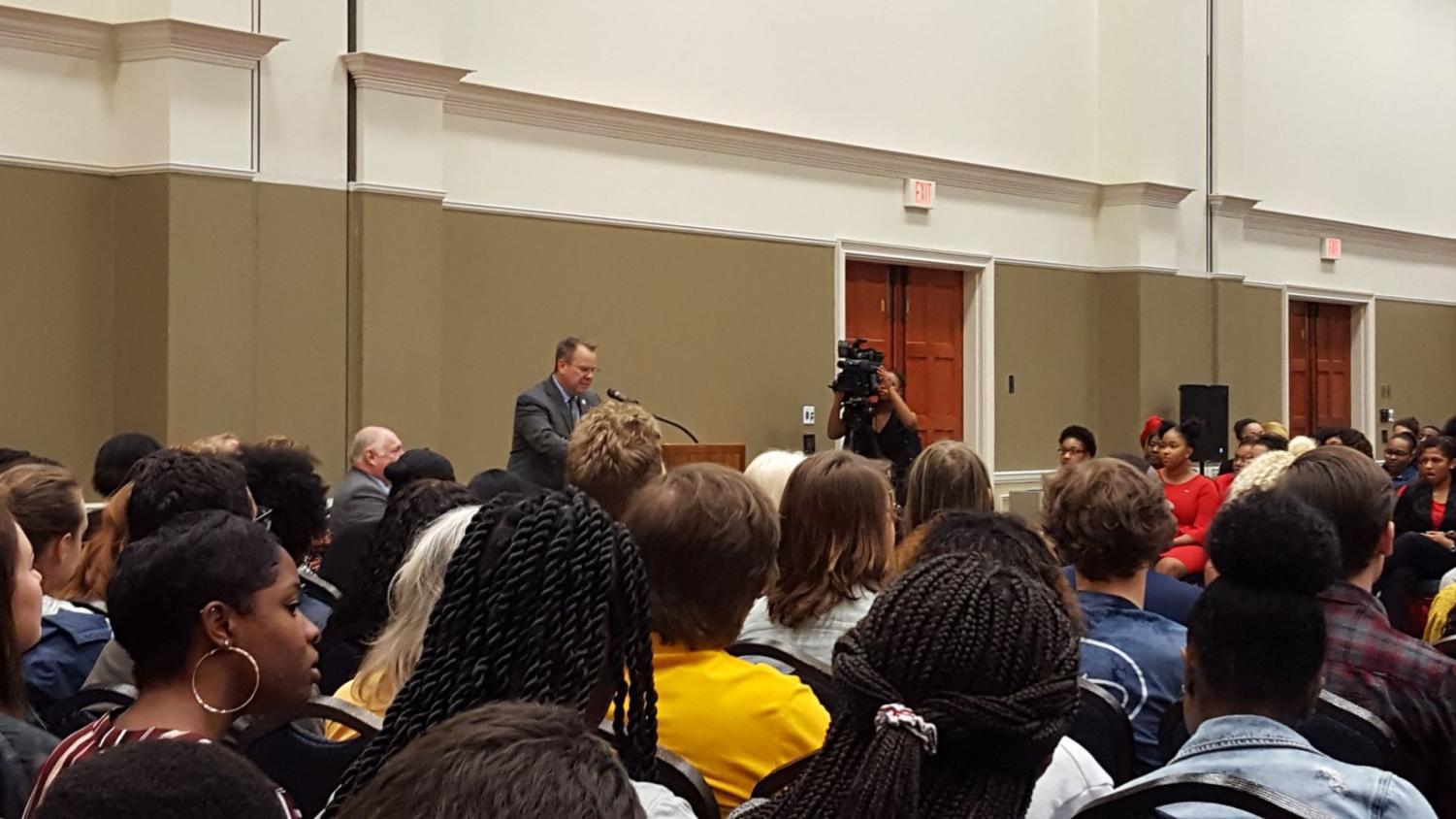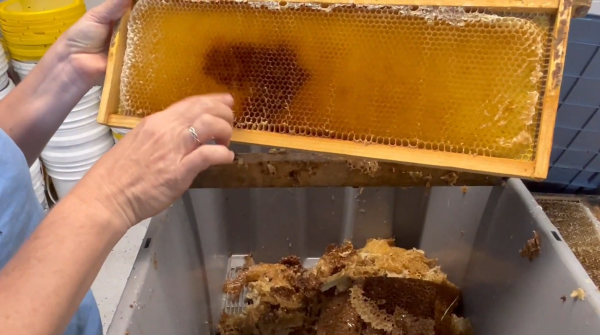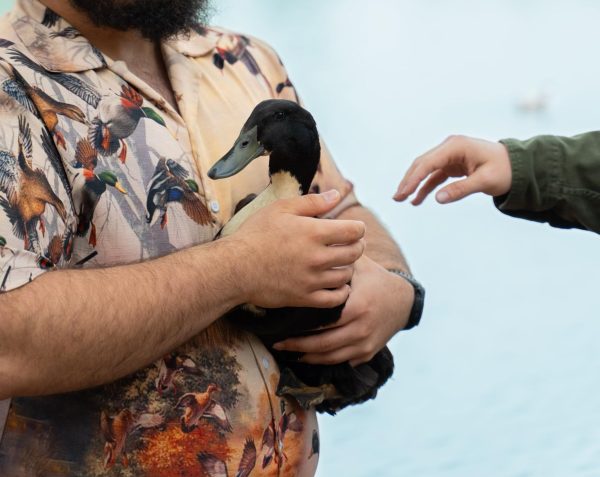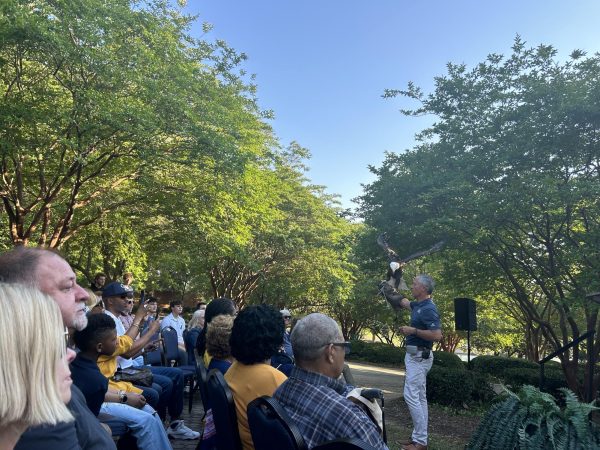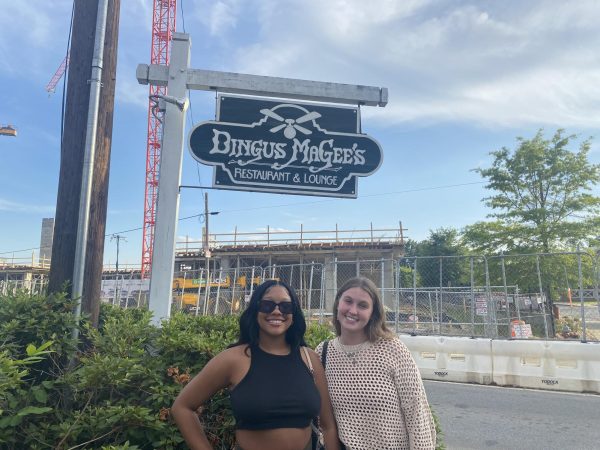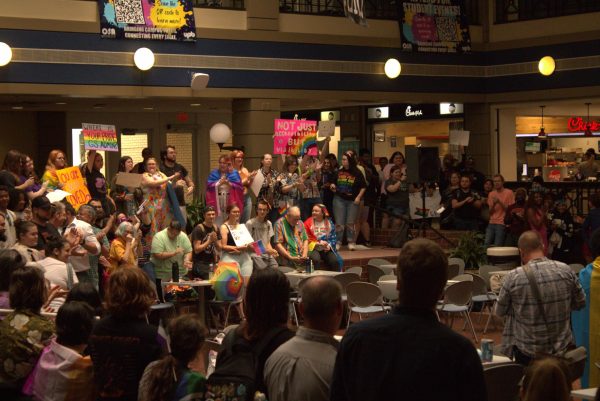Questions and answers from the SGA open forum
October 16, 2019
STATESBORO — The Georgia Southern University Student Government Association held an open forum alongside President Kyle Marrero and Provost Carl Reiber on Wednesday night to discuss last week’s book burning incident on campus.
Accommodations had to be made to the ballroom to enlarge the space for the amount of people in attendance. The event began at 6:50 with SGA President Juwan Smith welcoming the packed Russell Union ballroom, with the event planned to start at 6:30.
The floor was then opened up for questions. The exchange between Marrero, Reiber and the audience is transcribed below in Q&A format.
Q: I’ve noticed that a couple of words haven’t been said, does the university believe that the actions that were taken were racist? Does it condemn the racist actions or do they just condemn the action?
KM: “I wish there was an answer because I don’t know the intent of the actions other than ignorance, other than foolishness, other than not having an idea of what in essence that they were doing. But I don’t know [the students], I don’t know their heart, I don’t know if they are. But the actions themselves are repulsive, and symbolic of historic reflection of intolerance, and yes, of racism.”
Q: I know you got to cover yourself and your family and what you say in legal matters, I understand that completely. And you’ve got to uphold a powerful position that you have within this university. Give me a direct statement on the plans and the actions that you intend to take to solve this issue.
KM: I think it’s important for us that we continue to strive as a community as Georgia Southern to work together through education we understand the multiple perspectives and the people that come to our university.
Q: Do you acknowledge white privilege? And if you do, what do you define it as?
KM: I certainly think from the perspective of white privilege…with an understanding of growing up in an environment of which culturally, either socioeconomically, or the color of your skin, there’s a perspective of opportunity that doesn’t exist based on other people’s skin color or socioeconomic status. So absolutely, yes, I believe it does. And it is, it is something we have to understand…understand that self reflection and understanding and how we can engage with people that have not had that privilege or opportunities in their lives so that we can mutually, together, lift each other up.
Q: How can you tell me that these actions do not represent University when they are habitual actions? Because they happen every semester, especially every fall semester, whether the person who’s committing actions as a freshman or not. And you will condemn those actions.
KM: Historically, you’re accurate. And there is a history at this institution, these kinds of incidents that are at many state universities throughout the United States. We aren’t immune at this institution, and unfortunately have a history, one we have to own, admit and continue to work for to strive, correct and improve. We can’t not look back and know that history. I can’t guarantee it won’t happen again, but what I can guarantee is that we are striving to improve and to make your environment better here every day.
Q: There’s no working definition for diversity or working definition for inclusion in the student code of conduct. However, under student responsibilities we are required to be fair and courteous with others, treat them fairly with respect, showing sensitivity to cultural, ethnic and religious diversity and personal dignity. What consequences exist for students who do not follow these responsibilities, and if there are consequences why are these students not being punished?
KM: And it is unfortunately the same answer, and with [the code of conduct] and with that with free expression, the First Amendment of the Constitution overrides that… as a state university which is governed by the First Amendment.
Q: You say you pride yourself in the student code of conduct…I kinda have done some research. Section 13…subsection G restricts the “Setting, causing to be set, or participation in setting any unauthorized fire in or on University property”.
KM: This is fantastic because we believe me, we’ve been looking at as hard as you have.
Amber J. Culpepper, J.D., Interim Director, Equal Opportunity and Title IX Coordinator: So, the particular drills that we’re talking about here…outside of the residence halls, those do not require that. You don’t have to have permission to go out and use that grill. I just wanted to go back and re emphasize again that remember our starting point, though, is that speech is protected and expression and protected. And so we have to interpret that code of conduct in that light.
Q: I know you said you will not punish them but we need to have an action because we can’t let this go.
KM: In essence, the First Amendment overrides Student Code of Conduct. And so that is frustrating.
Q: What I want to know is, what do you plan to implement? Whether it be with the Statesboro PD girl at the campus PD to help students such as myself feel safe again at Georgia Southern.
KM: It’s a beginning we’ll have more of these more of these dialogues, open forums with our local police and Sheriff’s Department and University Police, when we can talk more and more about how communities can work together.
Q: What can you do and what can you do to ensure that this does not happen again?
KM: Conversations to ensure that our behaviors become a model. I think the history department said it in a really incredible way the other night, we have to be open to… bring those diverse things in so that we can have a dialogue and an opportunity to convince and to have greater understanding.
Q: Georgia Southern…obviously in South Georgia and among other reasons, I guess there’s a reputation associated with the name of the school. And this book burning definitely did no favors. In your opinion, what do you think needs to happen in order for us to get rid of this reputation and make this school a place where I’m proud to say I’m graduating from?
KM: Elevate the stories of you of your success and what you’re doing not only here as a student, but post graduation and your success in your career and telling that story. I just literally raced back from Savannah because I was giving a pitch for a large manufacturing company that would produce jobs for our engineering students. Talk to them about you about the students here and how incredible they are and how prepared they are when they graduate. It’s those stories we have to elevate above the noise of a few small subset of students who then, in essence, take over the news and the branding of this institution, we have to elevate above and rise above it and tell the positive stories and not tolerate the behaviors of the negative.
Sarah Smith contributed to this article
Davon Johnson, The George-Anne News Reporter, gaeditor@georgiasouthern.edu
Nathan Woodruff, The George-Anne Managing News Editor, gaeditor@georgiasouthern.edu


